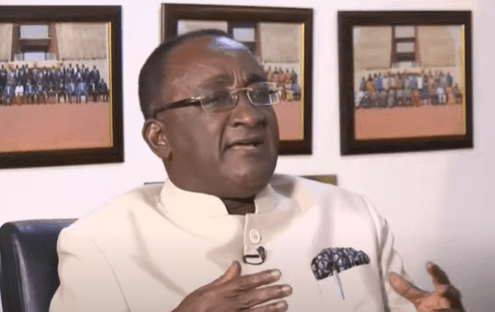The Food and Agriculture Minister, Dr. Owusu Afriyie Akoto, says critics of the government’s Planting for Food and Jobs policy are being unrealistic when they blame recent food price hikes on the alleged failure of the policy.
He insists that the policy is thriving and yielding astounding results just as envisioned by the President when he launched the programme.
According to him, such results can be seen in the Agriculture sector’s 8.4% growth last year even amid the Covid-19 pandemic.
Speaking on JoyNews’ PM Express he argued that the cause of food inflation in the country is as a result of external factors affecting the local agricultural industry.
“I’m just coming from spending 8 days in 5 forest regions, there’s a lot of food in the system. In the enclave of Bono East, Techiman going all the way to Ejura that enclave, physically we saw something like 25,000metric tonnes of maize from last year’s harvest packed there waiting for buyers. So for me if you say high prices of food and therefore the policy has failed, you’re not being realistic,” he said.
He continued, “The stocks are there, and don’t forget in the next one month the first harvest of this 2022 will be coming on top of what is already there. So it’s not a question of shortage of food, it’s rather to do with sharp increase in prices of basic items in the course of production; farm chemicals, last year farmers used to buy at a 120 now 400 Ghana cedis you can’t even get to buy fertilizer.
“The same thing, fuel prices have trebled so moving the crop from the farm to the consuming markets is gone through the roof. But in terms of on the farm itself, people are still moving into cultivating.”
He further explained that even though the government has had to deal with challenges acquiring inorganic fertilisers for farmers largely as a result of the Ukraine war, the government has been encouraging farmers to switch to organic fertilisers which are cheaper and available.
“People think that because there is no fertilizer so farmers are closing down their production. No, that’s not the case. The reaction of farmers to this shortage of inorganic fertilizer is to switch to organic fertilizer; both liquid fertilizer which we spray on the leaves rather than putting the stallings under the tree and under forms of fertilizer that are organically manufactured is even better.
“Because then the environment is saved, we use all kinds of input that we discard on the farms and in the urban areas to produce these organic fertilisers. And we’re encouraging farmers. And we didn’t need the encouragement actually, because what is happening is that they are going looking for alternative cheaper sources of fertilizing their crops.”
Latest Stories
-
Paris 2024: Opening ceremony showcases grandiose celebration of French culture and diversity
3 hours -
How decline of Indian vultures led to 500,000 human deaths
4 hours -
Paris 2024: Ghana rocks ‘fabulous fugu’ at olympics opening ceremony
4 hours -
Trust Hospital faces financial strain with rising debt levels – Auditor-General’s report
5 hours -
Electrochem lease: Allocate portions of land to Songor people – Resident demand
5 hours -
82 widows receive financial aid from Chayil Foundation
5 hours -
The silent struggles: Female journalists grapple with Ghana’s high cost of living
5 hours -
BoG yet to make any payment to Service Ghana Auto Group
5 hours -
‘Crushed Young’: The Multimedia Group, JL Properties surprise accident victim’s family with fully-furnished apartment
6 hours -
Asante Kotoko needs structure that would outlive any administration – Opoku Nti
6 hours -
JoyNews exposé on Customs officials demanding bribes airs on July 29
7 hours -
JoyNews Impact Maker Awardee ships first consignment of honey from Kwahu Afram Plains
8 hours -
Joint committee under fire over report on salt mining lease granted Electrochem
8 hours -
Life Lounge with Edem Knight-Tay: Don’t be beaten the third time
8 hours -
Pro-NPP group launched to help ‘Break the 8’
8 hours

